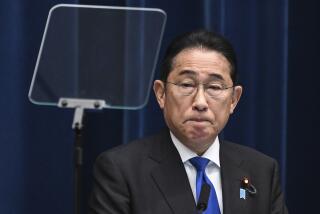Japan’s ruling party headquarters is attacked with firebombs and suspect is arrested

- Share via
TOKYO — A man threw several firebombs into the headquarters of Japan’s ruling party in Tokyo on Saturday, then crashed his car into the fencing of the prime minister’s residence, Tokyo police said. There were no reports of injuries.
The man, identified by police as Atsunobu Usuda, 49, was arrested on the spot on charges of obstructing the performance of official duties; more charges can be added.
Although the motive for the attack was not immediately clear, Japanese media reports said social media posts believed to be Usuda’s showed him complaining about the sums of money required to run for office under Japanese law, implying Usuda had political ambitions. The media reports also quoted unidentified sources as saying Usuda had taken part in protests against nuclear plants. Usuda was not immediately available for comment.
The ruling Liberal Democratic Party is increasingly unpopular with the public because of a ballooning money scandal involving dubious funding and suspected tax evasion. The party declined to comment on Saturday’s attack, referring all queries to the police.
Voting for the lower house of Parliament is set for Oct. 27. Some tarnished politicians lost the official backing of the ruling party but are running as independents.
The party recently chose a new leader, Prime Minister Shigeru Ishiba, hoping to present a new image. But polls show its popularity plummeting, although it’s still unclear whether they will lose their majority grip on the lower house in the upcoming election given the splintered opposition.
Some candidates have been heckled, which is relatively rare in Japanese culture.
The Liberal Democrats have ruled Japan almost continuously over recent decades. They are credited with leading Japan as it became an economic powerhouse from the devastation of World War II.
Then-Prime Minister Shinzo Abe was assassinated in 2022 while making a speech for a ruling party candidate during a parliamentary election. The killer used a handmade firearm, saying he resented Abe because his mother gave all the family money to the Unification Church, and he saw Abe as affiliated with that church. Such ties are still ongoing with some ruling party politicians.
Kageyama writes for the Associated Press.
More to Read
Sign up for Essential California
The most important California stories and recommendations in your inbox every morning.
You may occasionally receive promotional content from the Los Angeles Times.










